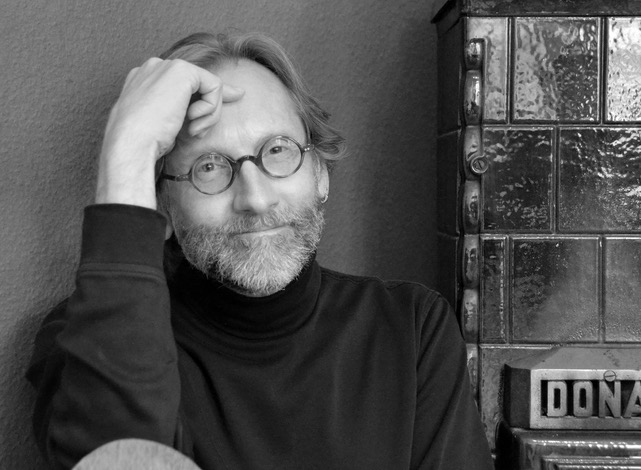Unfinalizable: Faculty feature with Lance Olsen
By Alyssa Quinn

Lance Olsen
Lance Olsen is a professor of English, the author of more than 30 works of and about innovative fiction, and a uniquely difficult person to write a profile about. In fact, his new novel, “Always Crashing in the Same Car: A Novel After David Bowie,” might be described as an anti-profile. Following David Bowie through the final months of his life, the novel collages multiple voices and points-of-view to explore the difficulties involved in deciphering such a kaleidoscopic figure.
Olsen’s interest in Bowie can be traced back to his teenage years, when he found himself drawn to the rock star’s countercultural ethos. After Bowie’s surprising death in 2016, Olsen began seeking out biographies of the man. What he found struck him: every biography conjured up a different Bowie. “The more I looked into him the less I learned about him,” says Olsen. “And that’s where the writerly tingle came.” The black box that was David Bowie allowed Olsen to explore fundamental questions about how we read other people, and how we’re read by them.
Olsen describes Bowie as “unfinalizable,” meaning he’s someone who engaged in constant reinvention, who refused to stay still or to be pinned down. Olsen observes that many musicians – and many writers – tend to settle into who they are, doing the same thing over and over. But not Bowie. Olsen loves that “Blackstar,” Bowie’s final album, is every bit as energetic as anything he did before, a testament to the man’s lifelong commitment to artistic innovation.
Olsen is interested in how all people are unfinalizable to some degree. He argues that identity is always a shifting, slippery concept. “We’re different people in different situations, at different times of our life, even different times of the day.” He wanted to find a literary form that could embody that sense of multiplicity, and so he turned, as he often does, to collage. “Always Crashing in the Same Car” assembles a variety of disparate voices and incommensurate visions, which rub up against each other and clash in interesting ways. For instance, the novel spends some time in the mind of Angie Bowie, David’s first wife. Olsen says it was magnificent settling into her voice because it so deeply contradicted David’s. That contradiction forced Olsen to grapple with Bowie’s darker side, with his capacity to hurt other human beings. “It became this really pained space for me, unlearning what I would like to have treasured about Bowie. I still do treasure, and don’t treasure, simultaneously.”
Unlearningis central to Olsen’s practice as a fiction writer. He received his M.F.A. in 1980 from the Iowa Writer’s Workshop, a celebrated program that nevertheless has a reputation for producing fairly traditional writers. There were a lot of assumptions there about how books should work, aesthetically and commercially. Olsen thought of himself as rebelling against those assumptions, but when he looked back later at his first novel, he realized that the Iowa mentality had shaped his work more than he’d thought. “I realized I needed to unthink everything that I had learned about writing, by writing a novel that would give me a lot of problems as opposed to a lot of solutions. And that’s what I did.” Ever since then, Olsen has found himself in a perpetual state of discovery and reinvention. “I like to think it would be hard for somebody to check in on my work every 3rd novel or so and be able to recognize it as one of mine because I can’t recognize it as one of mine. And that makes me happy.”
Olsen tries to foster this sense of discovery in his classroom as well, by exposing his students to experimental fiction. Undergraduates come into his class familiar with some literary forms – for instance, the traditional short story arc of exposition, conflict, rising action, climax, resolution. Olsen says that forms like these teach us how to simplify the world. Experimental fiction, on the other hand, leans into complication, uncertainty, and self-reflexivity. Olsen wants his students to know that stories don’t have to be told the way they’ve always been told, and that the world doesn’t have to work the way it’s always worked.
“One of the seriously, existentially wonderful things that the humanities does is invite us to unlearn continuously,” says Olsen. For him, the state of not-knowing is a productive, exuberant, invigorating space, one filled with adrenalized possibility. Lucky for him, he’s got a lot more of that ahead; after some 44 years in the classroom, 16 of which have been at the University of Utah, Olsen will be stepping down from full-time teaching at the end of this school year.
“I’m not using the term retirement, I’m using the world re-lifement,” he says. He says this next part of his life is about continuing to find new rhythms, about following David Bowie’s guiding principle of continuous reinvention. In a world where many things are designed to put us to sleep, Olsen says he wants to stay wide awake, to find himself constantly set back on his heels by all he still doesn’t know, about literature and about life. That’s why he’s excited to have worked with Bowie, who at 68 years old, was still asking himself that perpetual, essential question:
I wonder what’s next?
MEDIA CONTACTS
Jana Cunningham, University of Utah College of Humanities
jana.cunningham@utah.edu | 801-213-0866
Published April 10, 2023
